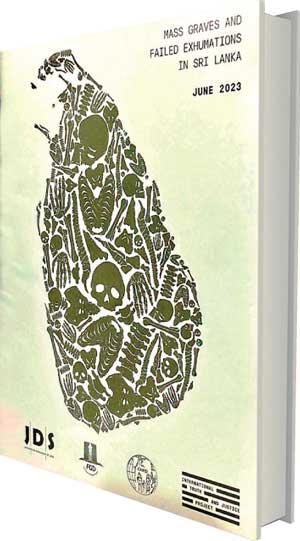Reply To:
Name - Reply Comment
 By Kurulu Koojana Kariyakarawana
By Kurulu Koojana Kariyakarawana
We are standing on a ground filled with skeletal remains and a country the UN rated second in the world for unsolved enforced disappearances, an HR activist opined yesterday at the release of a report based on a lengthy probe on mass graves in Sri Lanka.
“We are a race that respect the dead and dispose remains in a respectful way. But we are standing and stepping on a ground, which is filled with tens and thousands of human skeletal remains found from countrywide mass graves,” said Human Rights Activist Brito Fernando.
A report titled Mass Graves and Failed Exhumations in Sri Lanka – June 2023, authored by four organisations Centre for Human Rights Development (CHRD), Families of the Disappeared (FOD), International Truth and Justice Project (ITJP) and Journalists for Democracy in Sri Lanka (JDS) was released yesterday in Colombo.
Within a 30-year period from youth insurrections in the south and the communal conflict in the north, there had been 20 mass grave sites identified around the country including several most talked about ones in Chemmani, Mannar, Mullaitivu, Matale, Sooriyakanda and Hokandara.
“In the past, Sri Lanka was known for its Ceylon tea and cricket. But now it is known as the world’s second ranked country for enforced disappearances cases,” he said. Thousands of family members of those who went missing during the war or subjected to enforced disappearances had struggled a lot to obtain an office for the disappeared persons after 30 years. “The mothers of the disappeared welcomed the Office on Missing Persons (OMP) when it was introduced but they have all lost faith in it. The Auditor General recently said the OMP had received about 38, 000 applications of the missing but files had been opened only for 21, 000. Information about over 17, 000, who are missing to date has not been established,” Fernando said.
Several speakers including Attorneys K.S. Ratnavel of the CHRD and Upul Kumarapperuma pointed and Mario Gomes of International Centre for Ethnic Studies pointed out the failure of successive Sri Lankan Governments in finding out the truth behind mass graves and its failed exhumation attempts.
Activist Sandya Ekneligoda, whose husband and journalist Prageeth Ekneligoda is missing to date said how the wives and mothers in the north could expect justice from this system when I am being a woman from the south could not find justice for my partner.